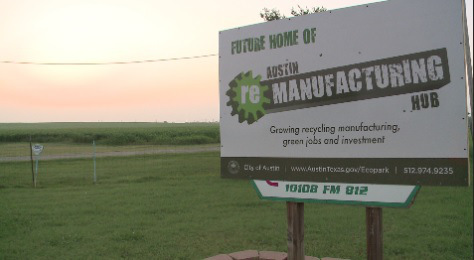Spotlight: The Greening of Economic Development
April 2015 Newsletter

There was a time where people who wanted to grow their own crops or buy an electric vehicle were on the fringes of society. That has all begun to change. Doing things in an environmentally friendly way has gone mainstream. Restaurants can charge top dollar for serving sustainable foods from local farms, and Tesla can charge $80,000 for an electric vehicle – and people are paying it. LEED certification for businesses and homes has become a sort of status symbol. People are rightly demanding more sustainable and eco-friendly options, and that change is reflected in economic development projects and priorities at the local and federal levels at every step along the way.
The city of Austin, Texas has an ambitious zero waste goal and has undertaken a number of projects in and around the city to meet it. In July 2014, EDA awarded the city of Austin a $1 million grant to help build infrastructure for the Austin [re] Manufacturing Hub, which will allow recyclables to be transformed into new products locally. Currently, many of the recyclable items collected in the city are sent overseas for manufacturing, which uses significant resources for transportation and provides job opportunities for other countries. By keeping these items in Austin, the [re]Manufacturing hub will help create jobs and investment from waste-based industry in the Central Texas region. In fact, the grantee estimates that more than 1,000 jobs will be created by recycling and reuse companies.

In addition to making existing processes greener and more efficient, it’s crucial that green products and technology make it to market in the first place. Sustainability and green technology is a major focus for entrepreneurs, but they need capital to get off the ground. The Chicago-based Clean Energy Trust offers business development support to clean energy startups by bringing together entrepreneurs with potential funding sources. Recently, it was announced that EDA will support the Clean Energy Trust through a $250,000 cluster seed capital fund grant under its 2014 Regional Innovation Strategies program.
As new technologies come to market, there is the issue of what to do with existing technologies and power sources, like coal. The President’s FY 2016 Budget proposes the POWER Plus (POWER+) Plan to increase and align a range of federal resources and programs to target assistance to coal communities and workers, address important legacy costs in coal country, and drive the development and deployment of lower carbon coal technology. EDA will be leading the coordination of the POWER initiative and the POWER+ plan. A major element of POWER+ is supporting Carbon Capture, Utilization and Sequestration (CCUS) technologies through tax credits. Specifically, the Administration is proposing $2 billion in new refundable investment tax credits (ITCs) for new and existing electric generating units that deploy advanced CCUS technologies. To qualify, new power plants must capture and store at least 75 percent of their emissions, and existing power plants must capture at least 75 percent of emissions from the units to which the eligible investment is applied. The Administration is also proposing new sequestration tax credits (STCs) for each ton of carbon dioxide that is permanently sequestered. The STCs would be guaranteed for 20 years of operation and the credit rate would be indexed for inflation. These tax credits would be particularly important for coal-fired power plants. This proposal recognizes that coal will continue to be an important part of the energy mix in this nation and around the world. As such, we must accelerate the development and deployment of CCUS technologies to ensure a sustainable future for the coal industry and for the success and affordability of global carbon mitigation efforts.
Economic development is a continuum, and today there is a desire and an effort to support green practices at all points along that continuum.


